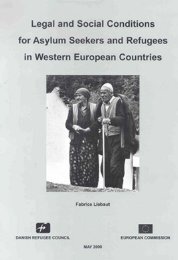Bulgaria - The social impact of seasonal migration
Bulgaria - The social impact of seasonal migration
Bulgaria - The social impact of seasonal migration
You also want an ePaper? Increase the reach of your titles
YUMPU automatically turns print PDFs into web optimized ePapers that Google loves.
78<br />
6.2. Integration <strong>of</strong> immigrants and refugees<br />
<strong>The</strong> integration <strong>of</strong> refugees begins after their registration as asylum seekers at the State<br />
Agency for Refugees. <strong>The</strong> <strong>Bulgaria</strong>n Helsinki Committee (BHC) has expressed its<br />
worries that integration begins as late as that stage and has criticised the Agency for its<br />
unwillingness to create transit centres at the borders, a fact which <strong>of</strong>ten leads to<br />
refoulement and breach <strong>of</strong> human rights (Human Rights in <strong>Bulgaria</strong> in 2002). Part <strong>of</strong> this<br />
problem lays in the inability <strong>of</strong> state institutions to distinguish between rejected<br />
irregular immigrants and those seeking asylum, as is evident from the annual statistics<br />
<strong>of</strong> the National Border Police Service at the Ministry <strong>of</strong> Interior. <strong>The</strong> lack <strong>of</strong> state<br />
finances and <strong>of</strong> a programme for repatriation <strong>of</strong> irregular immigrants as well as the<br />
impossibility <strong>of</strong> expelling illegally staying aliens, along with the lack <strong>of</strong> a normative basis<br />
to regulate the temporary status <strong>of</strong> tolerance, are the main reasons for the unfair and<br />
illegal lengths (in some cases several months to a year) <strong>of</strong> the administrative detention.<br />
Once allowed on the territory <strong>of</strong> <strong>Bulgaria</strong>, asylum seekers can use the services <strong>of</strong> the<br />
Integration Centre at the Agency. It <strong>of</strong>fers courses in the <strong>Bulgaria</strong>n language for<br />
beginners, at an intermediary level, for children, and for adults, as well as pr<strong>of</strong>essional<br />
training in sewing, hairdressing, cosmetics, arts and crafts, etc. Between September 1996<br />
and December 2002, over 1 700 refugees have attended these courses. Particular<br />
attention is paid on the courses for children. <strong>The</strong> teachers in <strong>Bulgaria</strong>n from the Centre<br />
have written a special handbook for teaching <strong>Bulgaria</strong>n to refugee children. Children<br />
can participate in drawing and flower arrangement clubs, while the adults are assisted<br />
in their communication with the Employment Offices, the <strong>social</strong> services, the municipal<br />
authorities, etc. Exhibitions, concerts, and children's feasts also take place there.<br />
Despite these efforts, the majority <strong>of</strong> the asylum seekers are not able to learn <strong>Bulgaria</strong>n<br />
to a sufficient level so as to find employment upon a positive decision on their status.<br />
One <strong>of</strong> the reasons is the very short term for which they can benefit from the Centre's<br />
services: 2-3 months for those who are granted refugee status and about a year in case<br />
<strong>of</strong> a refusal and subsequent appeal. Yet in the latter case the motivation for learning<br />
<strong>Bulgaria</strong>n and willing to integrate into the <strong>Bulgaria</strong>n society is practically non-existent.<br />
<strong>The</strong> second reason, however, is the lack <strong>of</strong> motivation <strong>of</strong> the asylum seekers during the<br />
status-granting procedure. <strong>The</strong>y might not wish to learn the <strong>Bulgaria</strong>n language until<br />
they know whether they would receive <strong>of</strong>ficial status or not. Poor language ability is<br />
citied as the most powerful barrier impeding integration both by the refugees and by the<br />
institutions dealing with them.<br />
Upon leaving the premises <strong>of</strong> the Agency, the refugees are helped in their integration by<br />
the <strong>Bulgaria</strong>n Red Cross, the UNHCR, Caritas Foundation and the BHC. <strong>The</strong> Refugee-<br />
Migrant Service at the <strong>Bulgaria</strong>n Red Cross (RMS) <strong>of</strong>fers <strong>social</strong> counselling and<br />
information in <strong>Bulgaria</strong>n, English, Persian and Arabic. It organises courses in <strong>Bulgaria</strong>n<br />
for which the refugees receive 40 BGN/month and have their transport expenses<br />
covered. At the moment, there are 2 groups, each <strong>of</strong> 10 persons, studying <strong>Bulgaria</strong>n. A<br />
special course has been organised for 2 Iraqi women with impaired eyesight. Monthly<br />
information on free workplaces is supplied to recognised refugees, together with<br />
courses in sewing, cooking, bar tending, arranging flowers, etc. <strong>The</strong> RMS runs a hot<br />
telephone line, provides psychiatric and psychological help, reimbursement <strong>of</strong><br />
medicines, additional nutrition for babies, kindergarten support, and distributes<br />
monthly allowance to Convention refugees within 10 months after recognition. With the<br />
UNHCR and the DAFI Programme, it <strong>of</strong>fers scholarships and/or covers taxes <strong>of</strong> 6<br />
recognised refugees studying at <strong>Bulgaria</strong>n universities, additional classes and manuals

















